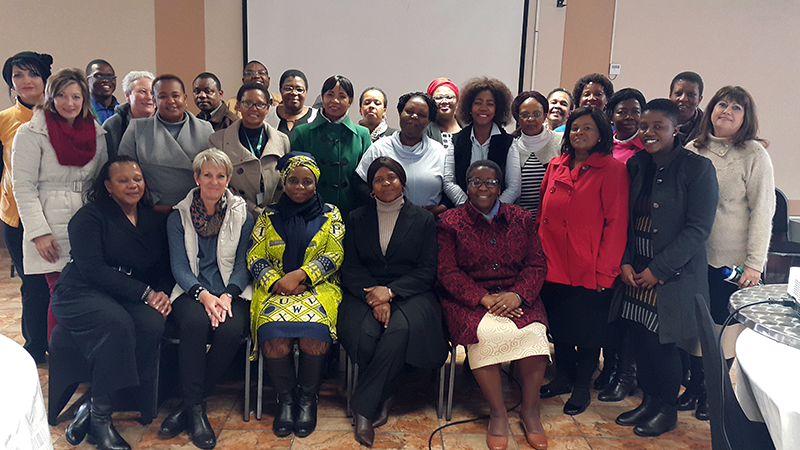
Producing over 40% of teachers in South Africa
The third instalment of the 2017 teaching and learning seminars, hosted by acting manager of Tuition and Learner Support in the College of Education (CEDU), Professor Meahabo Magano, took place on the morning of 27 July 2017 at the Mphebatho conference venue. Magano welcomed all the delegates and gave a brief overview on where T&L is heading.

Presenters and attendees of the third 2017 Teaching and Learning Seminar at the Mphebatho Conference Venue
Professor Veronica McKay, Executive Dean of CEDU, summarised the throughput of the college, challenging delegates to consider methods in which formative and summative assessment could be used to improve the quality of teachers in schools. THE ED announced that there would be a review task team which would be made up of delegates from the Department of Basic Education (DBE), South African Council for Educators (SACE), Department of Higher Education and Training (DHET), and Universities South Africa (USAf), formerly known as Higher Education South Africa (HESA). She further presented on the BEd Cohort Report 2006-2016 statistics, which reflected the higher dropout rate among African students. On this note, she emphasised the need to support African students in order to improve on the current scenario. She presented that higher-order learning is required to foster deep learning and that all 11 competencies should be looked at when performing assessments.
Presenting on the art of questioning in higher education, Professor Tintswalo Manyike of the Department of Language Education, Arts and Culture looked specifically at the way in which assessments should be used to clarify goals for both the students and academics, in preparing students to compete globally. She presented on Bloom’s Taxonomy as a lens in the art of questioning in higher education and emphasised it as a critical curriculum-planning tool, instructional delivery on assessment, and a crucial method of improving the assessment capabilities of students.
In a presentation on alternative assessment in higher education, Professor Geesje van den Berg of the Department of Curriculum and Instructional Studies revealed alternative assessment to be of the utmost importance at Unisa, as well as the foundation of good practices. These are central in the learning process online, distance, or face-to-face.
Professor Mishack Gumbo of the Department of Science and Technology Education raised the question of learner assessment and whether it is targeted at the learner or the educator. He emphasised the need for students to know that assessment is there to benefit them as it is central to the learning capacity of students and fundamentally influences the way that they respond to courses and behave as students. He further presented on Zulu Mama, a case study of the integration of SA’s first and third worlds, combining the craft of indigenous Zulu basket weaving with modern material.
Chris Opperman and Nancy Songo of Student Admissions and Registrations presented on Tutorial Letter 101 and Assessment. Opperman gave insight into the sequence followed after Senate approval. He also spoke on the challenges around why the assessment manuals are unable to keep up with changes in alternative assessments updates. The current administrative architect will be updated, and inputs are required from academics. The draft is said to be finalised in early 2018. Songo’s presentation highlighted the areas that are important in assessment plans, and that it is important for plans to be clear and completed before the semester starts.
The last speaker for the day, Dr Anniekie Ravhudzulo of the Directorate of University Teaching and Learning Development (DUTLD), presented on the role of the directorate and the nine steps followed in the writing of study guides.
*By Mosima Magomola
Publish date: 2017-08-03 00:00:00.0